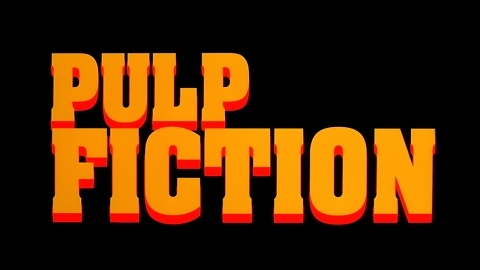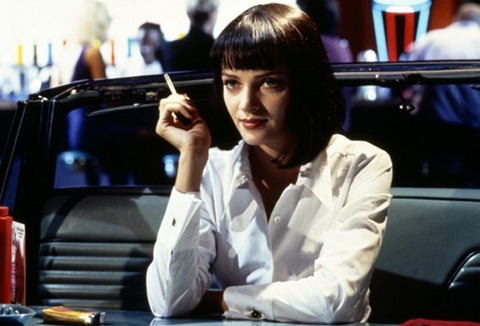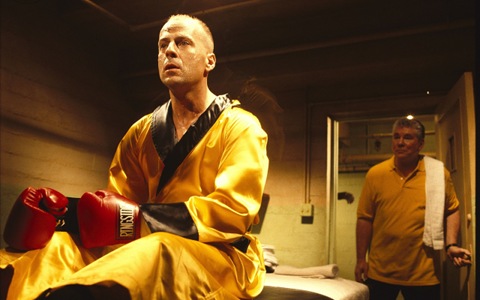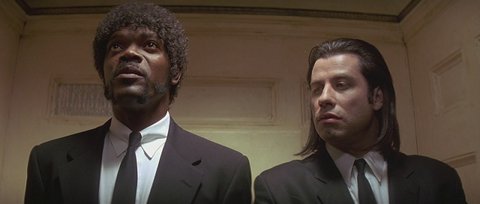BUY FROM AMAZON: CLICK HERE!
STUDIO: Miramax Films
MSRP: $19.99
RATED: R
RUNNING TIME: 154 Minutes
SPECIAL FEATURES:
- Not The Usual Mindless Boring Getting to Know You Chit Chat: Brand new retrospective created just for the Blu-ray release
- Here Are Some Facts on the Fiction: A roundtable of notable critics discuss Pulp Fiction‘s impact on cinema and culture
- Behind-the-Scenes Montages: A look at both the “Jack Rabbit Slim’s” and “Butch Hits Marsellus” sequences
- Marketing Gallery: You’ll get to see the US, UK, French, German and Japanese theatrical trailers. Plus 13 more TV spots, posters, and trade ads.
- Enhanced Trivia Track: Tales and tidbits from behind the scenes
- Pulp Fiction: The Facts – Documentary: A collection of interviews done for the 2001 special edition
- Deleted Scenes: 25+ minutes of Tarantino footage that almost stayed on the cutting room floor
- Production Designer Featurette: Conversations with Production Designer David Wasco and Set Decorator Sandy Reynolds-Wasco
- Siskel and Ebert “At the Movies” – The Tarantino Generation: A great discussion on Tarantino’s impact in the world of film
- Independent Spirit Awards: A less-morbidly obese Michael Moore interviews Quentin Tarantino
- The Charlie Rose Show: An almost hour-long interview with Mr. Tarantino
- Cannes Film Festival: The Palme D’Or acceptance speech
The Pitch
Quentin Tarantino’s 1994 follow-up to his directorial debut, Reservoir Dogs. Also, John Travolta.
The Humans
Quentin Tarantino (director), John Travolta, Samuel L. Jackson, Uma Thurman, Bruce Willis, Ving Rhames, Harvey Keitel, Tim Roth, Amanda Plummer, Christopher Walken
The Nutshell
Tarantino continues to play with nonlinear structure in this film, which amounts to three separate but interlaced narratives. The first deals with hitman Vincent Vega (Travolta) working alongside his partner Jules Winnfield (Jackson) as they retrive a mysterious briefcase for their boss, Marsellus Wallace (Rhames). The second narrative explores the fallout of Butch Coolidge stone-cold murdering the opponent he was supposed to lose to in a boxing match orchestrated by Wallace. The final narrative focuses on Jules’ struggle with faith amidst a hold-up in a diner where he and Vinnie were having breakfast.
Within the above-mentioned structure you’ll also find accidental head explosions, heroin overdoses, adrenaline shotes, stylish dance montages and of course, that glowing briefcase that everybody seems to want. Meanwhile, we never find out who-the-fuck keyed Vinnie Vega’s car. For shame.
The Lowdown
If Reservoir Dogs created a minor pop culture stir, then 1994’s Pulp Fiction was the filmic zeitgeist that reigned down and killed the dinosaurs. It might sound like hyperbole, but consider that Shawshank Redemption and Forrest Gump both came out that year as well – yet Pulp Fiction hasn’t been overshadowed. Nor has its impact lessoned in the 17 years since its release. Young, budding screenwriters still try to emulate Tarantino’s cooly unstructured narrative approach. People still quote the famous “royale with cheese” scene. And politically, it even generated its own dividing line. When Bob Dole attacked the entertainment industry for peddling “nightmares of depravity,” many interpreted that as criticism lobbed primarily at Pulp Fiction: a film that contained the word “fuck” 265 times. How fucking cool is that?
More important than its pop culture impact or the indie film fire it ignited, or even the debates on violence and sex that it propelled: Pulp Fiction is simply a well put-together film. To this day, it’s still the film I first think of when I hear the name Tarantino. The scene where Uma Thurman’s Mia dances to Neil Diamond’s “Girl, You’ll Be a Woman Soon,” represents everything Tarantino the Filmmaker is about. It’s pop culture, sex, violence and death and it’s all deftly molded into a single and complete (even in the context of the scene itself) work. Tarantino operates as a filter of sorts, taking contrasting cultural influences and then generating them into filmic ideas to get a story across – a tactic used by many a filmmaker, but rarely so effectively or in such a uniquely expressive manner. In the case of this scene, it’s a simple dance. But it also hints at the hell that awaits Mia when she finds what she thinks is coke in Vinnie’s coat.
It’s a film that proudly wears its influences on its sleeve but, unlike Kill Bill, never feels derivative of the works that its homaging. Probably because it’s so batshit and encompasses so many bugfuck ideas. Ever wanted to see Bruce Willis stab sadomasochistic sex fiends with a samurai sword? Pulp Fiction. Wondered about the painstaking process involved with cleaning brain matter out of your car? Pulp Fiction. Howabout Ving Rhames getting savagely buttfucked by the above-mentioned sadomasochists? You get the idea. I’d argue that the film is firmly entrenched in the realm of black comedy, but it hits on a lot of genres nonetheless.
This was also the film that single-handedly resurrected Travolta as a viable entertainer. One could argue that he’s worked hard to tarnish that good image in the films he’s done since, but it reinvented him as a performer. Travolta hasn’t had a performance where he’s measured up since, and it’s hard to imagine that the guy from Wild Hogs once breathed life into lovable, homicidal Vincent Vega.
If Travolta’s performances haven’t measured up, Sam Jackson has been turning in nothing but subtle variations on his performance here (with a few notable exceptions). His Jules is equally as iconic if not moreso than Vinnie. He quotes scripture, he’s thoughtful and measured, his wallet says “Bad-Ass Muthafucker.” These two hitmen were the performances of a lifetime and it’s a testament to Tarantino’s writing and direction that the work they’ve done since hasn’t come close.
Listen, it’s Pulp Fiction. You’ve seen it. If you haven’t then you’ve come to the wrong site. If you’re a lover of cinema and want to experience a film that pushes the medium into new (to the popular consciousness, anyway) territory – Pulp Fiction was and still is exactly that.
The Package
Loaded. My old two-disc collector’s edition has been put through the ringer over the years. If you’re like me, you’ve been waiting for a Blu release to make the upgrade. Luckily, this offer is a worthy successor. The AVC-encoded 1080p transfer was personally supervised by Tarantino and looks incredible on a flat screen. The sound’s presented on DTS-HD Master Audio 5.1 and is the best I’ve heard the film sound so far. Owners of the old collector’s edition might find a lot of the same special features on this disc, but there’s also some new shit that makes it worth a purchase. The “Not The Usual Mindless Boring Getting to Know You Chit Chat” retrospective does a much more-encompassing job of summarizing the film’s impact than I could ever hope to. And if you haven’t seen the Siskel and Ebert “At the Movies” discussion I highly suggest you check it out for a solid exploration of the Tarantino-effect on modern cinema. Whether you’re a Blu-ray completist or simply a fan, this disc is an excellent addition to your collection.
Rating:





Out of a Possible 5 Stars



